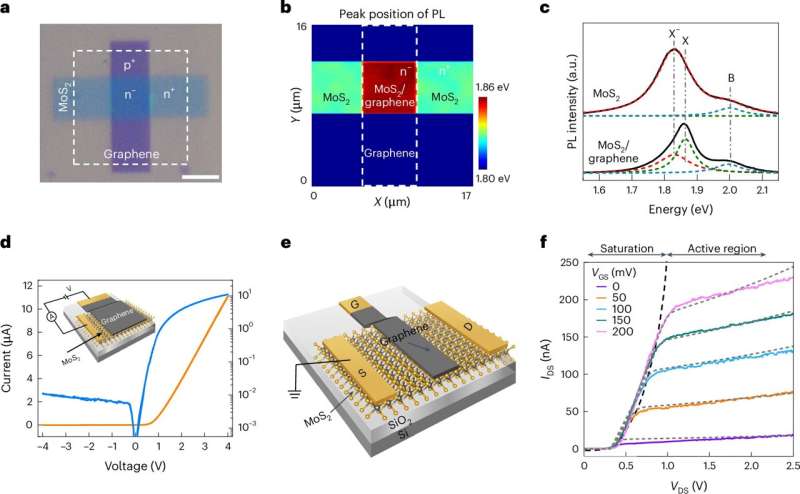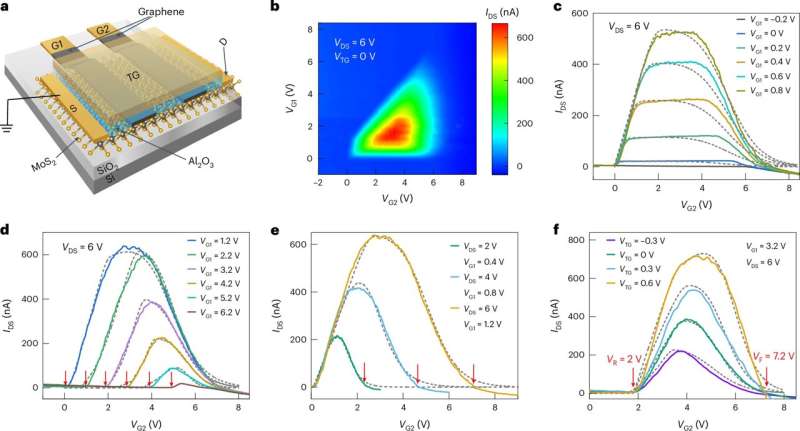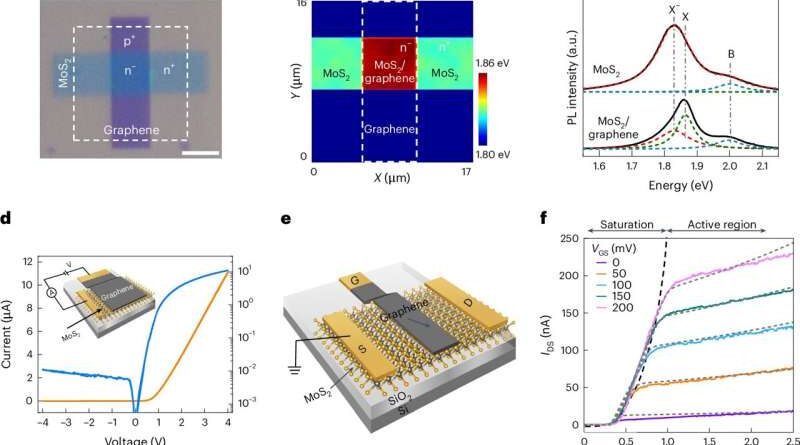A new transistor for fuzzy logic devices shows promise for improved computing

Device structure, PL spectra and electrical characteristics of vdW-IJT. Credit: Natural Electronics (2024). DOI: 10.1038/s41928-024-01256-3
Edge computing devices, devices that are close to the data source rather than in large data centers, can perform calculations locally. This can reduce latency, especially in real-time applications, as it can reduce the need to transfer data from the cloud.
Implementing deep learning algorithms in backend applications has proven difficult, in part due to their computational complexity and limited computing resources. Fuzzy logic systems, computer architectures that rely on reasoning rather than binary logic systems, can help overcome these problems.
Researchers at the University of Southern California, Northwestern University, the University of Hong Kong, the Chinese Academy of Sciences, and other institutions have recently developed a new multi-gate van der Waals interfacial junction transistor that which could be used to create abstract cognitive devices as well. This transistor, presented in the paper Natural Electronics,
“Artificial networks are powerful tools driving the current AI revolution,” Han Wang of the University of Hong Kong, senior author of the paper, told Tech Xplore. “However, their implementation requires very complex devices with high power consumption, which limits their use to sharp devices that process information locally and in real time . On the other hand, abstract logic works with simple rules, requires less hardware, and can handle many tasks successfully.
Van der Waals materials, metals held together by weak van der Waals forces, have proven promising for the creation of efficient organ generators. These are the most powerful parts of fuzzy logic, which are responsible for creating so-called membership functions (that is, functions that define the degree of participation in fuzzy sets) .
Continuing the initial research efforts, Wang and his colleagues set out to develop a new transistor based on van der Waals materials that could be used to produce efficient organ generators. The transistor they created is based on molybdenum disulfide (MoS2), a transition metal dichalcogenide widely used in the development of electronic devices.

Device structure and electrical characteristics of widely used multigate vdW-IJT. Credit: Natural Electronics (2024). DOI: 10.1038/s41928-024-01256-3
“Van der Waals interfacial junction transistor (vdW-IJT) is built on MoS.2 homojunction with different types of carriers at different positions, which shows the current or separation controlled by the many gate channels of graphene,” explained Hefei Liu, first author of the paper.
“Its main advantage is the ability to generate Gaussian or π functions within a single device, while traditional CMOS technology requires tens of transistors to achieve this. generators.”
As part of their research, Wang and his colleagues combined their transistors with peripheral circuits to create discrete logic devices that can control infinite systems. This hardware was used to run simple convolutional neural networks (CNNs) that were trained to complete image classification tasks.
“We have discovered the significant potential of emerging vdW devices to enable new hardware concepts and computing architectures, such as virtual networks, in smart applications that achieve complex performance through the use of low energy,” said Jiangbin Wu, the lead researcher involved in the work.
“This advance could shift information processing from data centers to local devices, providing real-time feedback and extending battery life for applications such as motion control. robots and autonomous vehicles.”
The researchers found that the amazing system they developed by combining transistors and CNN achieved incredible accuracy in image classification tasks. In the future, their proposed design could encourage the development of similar electronic components aimed at improving the capabilities of deep learning devices.
“Our future studies will focus on the large-scale implementation of logic systems based on vdW-IJT, on scalable logic processing, differential control, and integration with neural network tools, ” added Mark Hersam of Northwestern University, another lead researcher on the project. “This effort aims to provide smart devices that are capable and efficient for real-world applications.”
Additional information:
Hefei Liu et al, A van der Waals interfacial junction transistor for fuzzy logic devices, Natural Electronics (2024). DOI: 10.1038/s41928-024-01256-3
© 2024 Science X Network
Excerpt: New transistor for fuzzy logic devices shows promise for improved computing (2024, November 6) Retrieved November 7, 2024 from https://techxplore.com/news/2024 -11-transistor-reconfigurable-fuzzy-logic-hardware.html
This document is subject to copyright. Except for any legitimate activity for the purpose of private study or research, no part may be reproduced without written permission. Content is provided for informational purposes only.
#transistor #fuzzy #logic #devices #shows #promise #improved #computing
